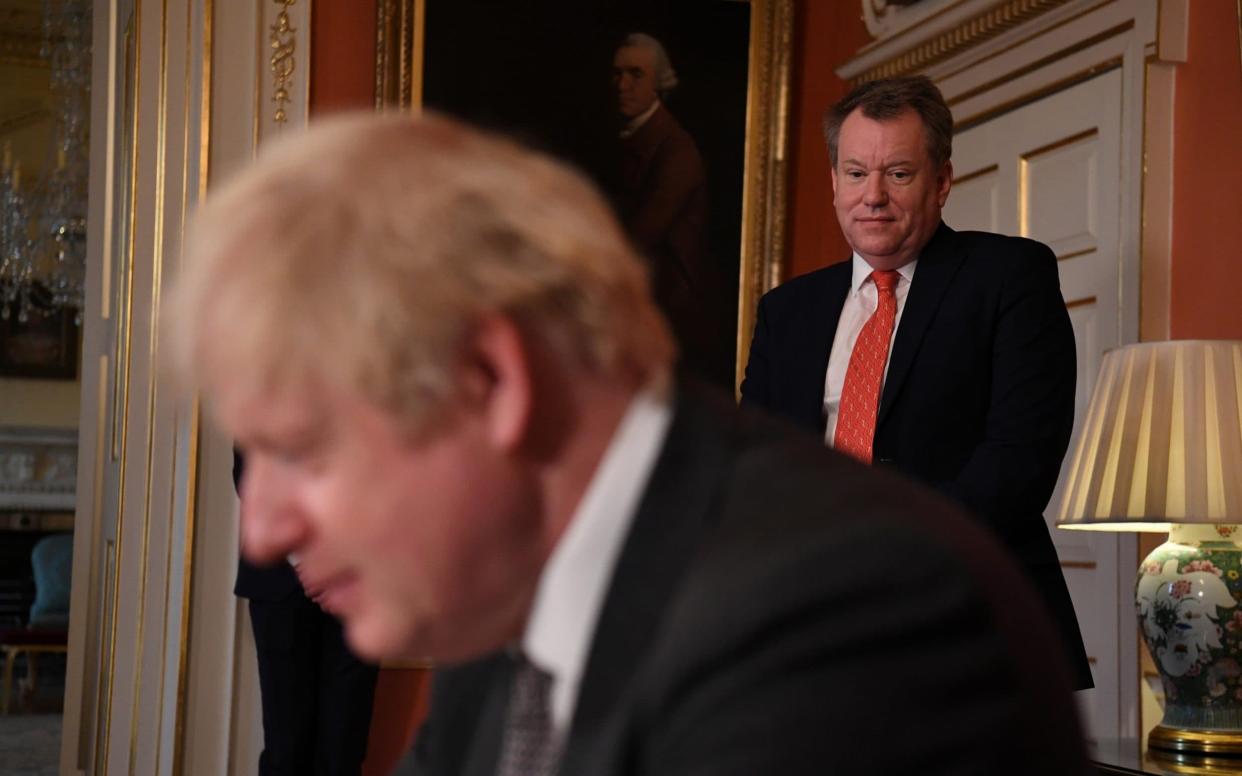Analysis: Lord Frost wastes no time in ruffling Brussels' feathers

- Oops!Something went wrong.Please try again later.
- Oops!Something went wrong.Please try again later.
Boris Johnson has grown increasingly frustrated with the EU’s interpretation of the Northern Ireland Protocol and is determined to force an urgent reset of the discussions with Brussels.
Lord Frost’s ability to get under the skin of his opponents and get results will have persuaded the prime minister to promote his chief negotiator to the key role in charge of relations with the EU.
“Frosty the no-man” is seen as the ideal replacement for Michael Gove, who was suspected of not being “punchy” enough with Brussels. The tougher approach is believed to be backed by Northern Ireland Secretary Brandon Lewis.
The new Cabinet minister has wasted no time in testing both the Protocol, and the patience of his EU interlocutors, to the limits.
The announcement that the UK would unilaterally extend grace periods in the treaty to protect supermarkets infuriated Brussels and amounts to a hand grenade thrown into the ongoing talks over its implementation. EU officials were quick to point out that the UK was not legally able to extend temporary relaxations for supermarkets to ensure continued supplies from Great Britain.
When news of Lord Frost’s promotion was announced, EU diplomats warned him to drop his confrontational style.
Yesterday those sources accused him of reverting to type by threatening to violate the treaty just one day after he held surprisingly warm talks with Clement Beaune, France’s Europe Minister and a staunch Brexit critic.
This will not bother Lord Frost, who only began his new role as minister for relations with the EU on Monday, one jot.
It is an open secret that he is no fan of the Northern Ireland Protocol and he has form when it comes to ruffling feathers in Brussels during his spell as the UK’s chief Brexit negotiator.
In his view, the Protocol was a necessary evil forced upon the UK by the flawed negotiations under Theresa May’s government.
He negotiated it as a replacement for the Irish border backstop to prevent a hard border on the island of Ireland in 2019.
That paved the way for the Withdrawal Agreement to finally be ratified by the House of Parliament and for the trade talks in 2020 that ultimately ensured the UK left the EU with a trade deal on January 31.
Lord Frost was determined that the same mistakes made by his predecessor would not be repeated during the trade talks.
He adopted an uncompromising strategy that prioritised UK sovereignty over all else, in an ultimately successful tilt to knock Brussels off its stride and reset the relationship.
The disruptive tactics infuriated Brussels but brought results, albeit at the cost of greatly increased friction in UK-EU trade.
In the end, even Michel Barnier was talking about the need to respect “EU sovereignty”; a clear sign that the prevailing narrative of the negotiations was successfully altered.
This was no easy task, especially when negotiating with a much larger bloc that is confident its superior heft makes it inevitable that it will win concessions.
It requires tenacity and patience to convince the immovable object of the EU to reconsider and move closer to the British position.
Lord Frost has now plucked the same page out of his negotiating playbook to try and shake Brussels out of its complacency over the Northern Ireland Protocol.
It is a calculated gamble but one that will inevitably redraw the dynamics of the UK-EU negotiations; for better or worse.

